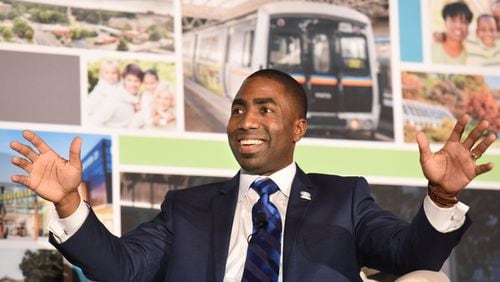DeKalb’s CEOs
Manuel Maloof, 1985-1992
Liane Levetan, 1993-2000
Vernon Jones, 2001-2008
Burrell Ellis, 2009-present (suspended)
Lee May, 2013-present (interim)
Forms of county government in metro Atlanta
CEO (DeKalb): An elected CEO heads the executive branch, and the county commission manages the legislative branch.
County manager (Cobb and Fulton): An appointed county manager handles day-to-day operations and answers to county commissioners
County administrator (Gwinnett): An appointed county administrator oversees operations; county commission retains ultimate policy and executive responsibility
Source: Association County Commissioners of Georgia
Forms of county government in metro Atlanta
CEO (DeKalb): An elected CEO heads the executive branch, and the county commission manages the legislative branch.
County manager (Cobb and Fulton): An appointed county manager handles day-to-day operations and answers to county commissioners
County administrator (Gwinnett): An appointed county administrator oversees operations; county commission retains ultimate policy and executive responsibility
Source: Association County Commissioners of Georgia
Democracy in DeKalb County works a bit different from the rest of Georgia, with a powerful CEO position in charge of the government, leading to nearly 40 years of debate.
The argument over who should run DeKalb is being revived again, as a group of residents considers whether to move away from an elected executive running the county.
A sort of local-level Constitutional Convention for DeKalb began its work last week, launching a 14-month review of the county’s form of government.
Broad reforms are on the table, including the county’s leadership structure, balance of power, term limits, elected officials’ pay, district boundaries, ethics, transparency and more. The DeKalb Charter Review Commission must release its findings by Dec. 1, 2017, and then it would be up to the Georgia General Assembly to decide whether to make them law.
Created in 1982, the CEO position has often been blamed for concentrating authority in one person and leading to abuses of power.
Those seeking to eliminate the CEO job prefer that DeKalb more closely mirror its neighbors in Cobb, Fulton and Gwinnett, where professional managers oversee government operations and answer to county commissions. DeKalb is the only county in the state with a CEO independent from the legislative branch, although that structure is more common in cities like Atlanta with a strong mayor over the executive branch.
Supporters of the CEO role say it creates a clear separation of powers, similar to the federal government, with distinct executive and legislative branches. The CEO represents the entire county rather than one district, making the position more accountable to voters.
Interim DeKalb CEO Lee May, who will leave office at the end of the year, said it’s time for residents to decide whether to retain the position he’s held for three years.
"We're starting something brand new," May told the Charter Review Commission at its first meeting Sept. 22. "What do we want to see in our form of government? There is still a ton of work to be done to clarify powers and responsibilities."
May formed the 17-person commission through an executive order in April after legislation that would have done the same thing failed to pass the Georgia General Assembly. May, the county's fifth CEO, supports the elimination of the position but said he won't influence the commission.
Some residents are skeptical of whether changing DeKalb’s leadership would be an improvement, saying the county’s difficulties extend beyond the CEO structure.
“What problem are we trying to solve?” asked Sandy Johnson in comments to the commission. “It’s not just a question, in my mind as a citizen, of the form of government.”
Before DeKalb had a CEO, the county was run by a seven-member commission whose chairman was responsible for government administration. But that changed after a 1976 Georgia Supreme Court decision, Guhl v. Williams, which concluded that the County Commission had the authority to diminish the power of the chairman.
Then two citizen-led committees were formed, and both recommended instituting the CEO job.
“Both groups decided that the powers and duties of the chairman were no longer clear and could not be clear as long as the chairman had only those powers delegated to him by the Board of Commissioners,” according to the DeKalb Government Reorganization Commission’s report in 1979. “In order to increase the administrative efficiency of the county, they recommended a government with separate executive and legislative branches, each with limited and clearly defined powers.”
When the issue was placed on the ballot in August 1982, 57 percent of voters approved changing to the CEO government.
Ever since, the CEO position has led to power struggles with commissioners and arguments over how to best represent residents.
The special grand jury that investigated DeKalb CEO Burrell Ellis — eventually leading to his conviction for attempted extortion and perjury — said in its 2013 report the CEO job “creates an unnecessary layer of politics within our government for which the return to the citizens of DeKalb County is minimal.”
This year, state lawmakers considered abolishing the chief executive job but legislation failed to advance, with many representatives saying they wanted to study the issue before making a change.
Voters will decide on DeKalb’s next CEO in November, when Democrat Mike Thurmond faces Republican Jack Lovelace.
Proposals to overhaul DeKalb’s government structure will likely resurface at the state Capitol in 2018, after the Charter Review Commission finishes its work.








